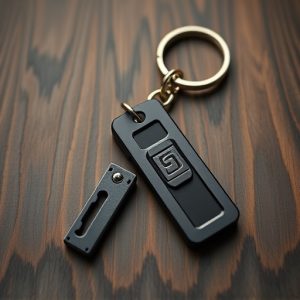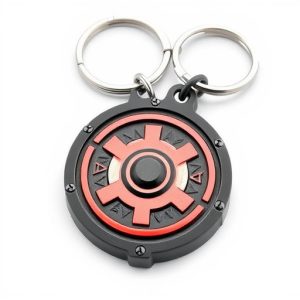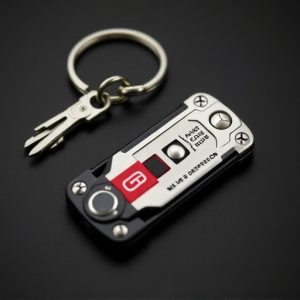Maximizing Defense Keychain Grip: Metal Choices for Strength and Durability
Designing military-grade keychain defense tools demands premium materials like stainless steel, tita…….
Designing military-grade keychain defense tools demands premium materials like stainless steel, titanium, aluminium, or high-strength steels for superior durability and strength. Corrosion resistance is key, ensuring longevity in diverse environments. Ergonomic designs with textured grips enhance user control and comfort during critical situations, while balanced weight distribution allows precise deployment. Reinforced joints make these keychains reliable defensive accessories for military and security-conscious individuals.
“Enhance your personal safety and security with an innovative Metal Defense Keychain—a versatile tool designed for critical situations. This comprehensive guide explores the art of crafting robust keychains using premium metals like stainless steel, titanium, or aluminum, ensuring durability and strength. From ergonomic design elements to integrated defense features, we uncover essential tips for creating military-grade keychain defense tools. Discover how textured surfaces, built-in flashlights, and discreet security mechanisms can provide peace of mind in challenging environments.”
- Choosing the Right Metal for Durability and Strength
- – Discussing the importance of high-quality metals like stainless steel, titanium, or aluminium for keychains meant for defense purposes.
- – Highlighting each metal's unique properties, including resistance to corrosion, strength, and weight considerations.
- Design Elements for Enhanced Grip and Control
Choosing the Right Metal for Durability and Strength
When designing a metal defense keychain grip, one of the most critical considerations is selecting the appropriate alloy for durability and strength. Opting for military-grade materials ensures your keychain can withstand rigorous use and tough conditions. Steels like 4140 or 52100 are popular choices due to their exceptional hardness and resistance to wear and tear. These high-strength alloys are commonly used in military applications, making them ideal for defense tools that require reliability.
The right metal choice plays a significant role in the overall performance and longevity of your keychain grip. A robust metal alloy not only enhances the tool’s ability to defend but also ensures it can bear the weight of everyday carry (EDC) use without compromising its structural integrity. Additionally, considering factors like corrosion resistance, especially when exposed to varying environments, will further contribute to the keychain’s durability, making it a dependable companion for those who rely on their defense tools.
– Discussing the importance of high-quality metals like stainless steel, titanium, or aluminium for keychains meant for defense purposes.
When designing a keychain for defense purposes, prioritizing high-quality metals is paramount. Materials like stainless steel, titanium, and aluminium offer exceptional durability, corrosion resistance, and strength—essential attributes for tools that may be relied upon in critical situations. These metals are commonly associated with military-grade equipment, ensuring reliability even under extreme conditions, making them ideal choices for keychains meant to serve as defense tools.
High-end metals provide not only superior performance but also enhanced aesthetics, contributing to the overall quality and appeal of the keychain. Their resistance to wear and tear ensures that the tool remains functional over time, a crucial factor in a device intended for self-defense or emergency use. Opting for these materials reflects a commitment to creating robust and dependable keychain defense tools.
– Highlighting each metal's unique properties, including resistance to corrosion, strength, and weight considerations.
When designing a military-grade keychain defense tool, understanding and leveraging metal properties is key. Stainless steel, for instance, offers superior corrosion resistance, making it ideal for durable and long-lasting keychains meant for harsh environments. Its strength allows for robust locking mechanisms, while its relatively light weight ensures the keychain remains comfortable to carry.
Aluminum, another excellent choice, boasts a high strength-to-weight ratio, providing exceptional maneuverability without sacrificing sturdiness. This metal is highly resistant to corrosion as well, thanks to its natural oxide layer. For ultimate toughness, consider tools crafted from high-strength steels like carbon steel or tool steel, which offer superior edge retention and the ability to withstand extreme stress, making them perfect for heavy-duty defense applications.
Design Elements for Enhanced Grip and Control
When designing a military-grade keychain defense tool, focusing on grip and control is paramount. Ergonomic shapes and textured surfaces significantly enhance user comfort and proficiency during stressful situations. Incorporating elements like a non-slip grip or a contoured design can ensure a secure, firm hold on the keychain, allowing for swift and precise control. These features are especially crucial when the keychain is used as a self-defense weapon, ensuring users can effectively deploy it without dropping or mismanaging it.
Additionally, balanced weight distribution across the keychain’s body contributes to improved control and maneuverability. This balance enables users to swing or throw the keychain with accuracy and force, making it an effective defense tool. Features such as reinforced joints and durable materials further bolster grip strength, ensuring the keychain can withstand rigorous use without compromising its functionality as a defensive accessory for military personnel or individuals seeking enhanced personal security.
When crafting a military-grade keychain defense tool, the combination of robust metal and thoughtful design elements is key. Opting for materials like stainless steel, titanium, or aluminum ensures durability, strength, and resistance to the elements—crucial attributes for a reliable self-defense accessory. By integrating ergonomic grip patterns and strategic weight distribution, you enhance control and ease of use, making it an indispensable defense option for those who prioritize safety and preparedness.


